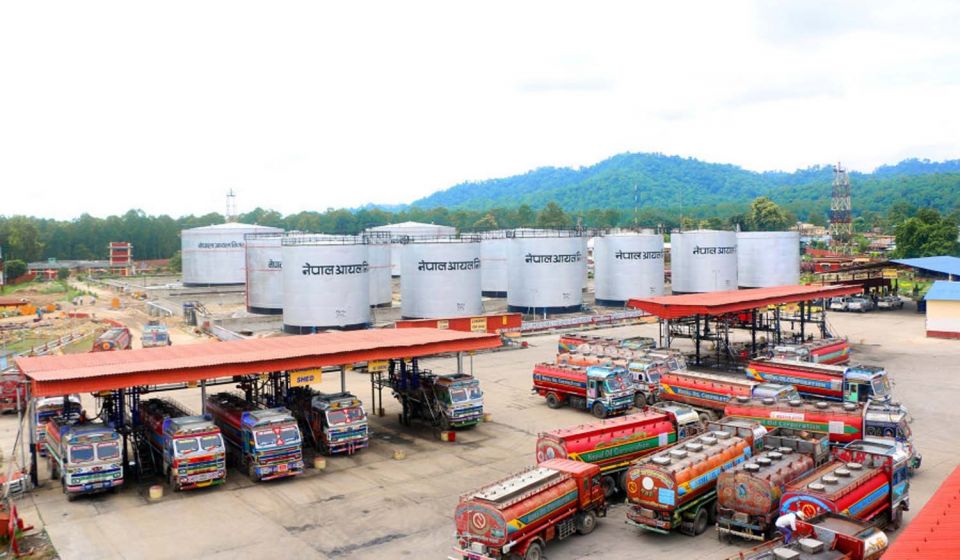
Nepal Oil Corporation continues to charge high prices even when the cost of oil on the international market has tumbled, analysts say.
Inflation-stricken consumers complain they are hit with a price hike every time rates on the international market go up, but the state-owned oil monopoly does not respond with the same quickness when it is the other way around.
Nepal Oil Corporation says it cannot slash prices because of massive losses, but insiders point out that it is making a profit for the first time in 20 months.
Costly fuel has added to the pain of Nepalis struggling under high inflation. There is a growing public furore that even though world prices have been falling for the last two months, this has not been reflected in the domestic market.
The government company has said that prices may not come down because of its negative balance sheet, adding that if there is pressure to cut prices, the supply system may be disrupted.
Nepal Oil Corporation has revealed it is currently making a monthly profit of Rs790.87 million, thanks to a fall in crude prices in August and September.
According to international media reports, the average price of Brent crude oil dropped to $86.27 a barrel in September before climbing to $91.63 in mid-October.
Birendra Goit, director of Nepal Oil Corporation, said the corporation was back in the black after 20 months. “Prices have been going down for the last two months, but the mid-October period looks uncertain as the price of crude has started increasing.”
The International Monetary Fund (IMF) said in its latest report that as the cost of living continues to rise, policymakers around the world will need to protect the most vulnerable members of society from the impact of higher prices.
Poorer households often spend relatively more than others on food, heating and fuel, categories that have seen particularly steep price increases. Moreover, households cannot easily adjust consumption to minimise spending on these products; everyone must eat and use heating, and transportation (whose price is often determined largely by fuel costs) is often essential to get to work, the report said.
In countries with well-developed social safety nets, targeted cash transfers to those particularly exposed to higher energy and food prices (such as children and older people) and existing automatic stabilisers (for example, unemployment insurance) are the best ways to limit the impact on those least able to bear it.
However, measures to limit the inflationary impact should offset any increase in new spending. In countries lacking well-developed safety nets, governments should look to extend any already active programmes, according to the IMF report.
While Nepal's caretaker government cannot make crucial decisions ahead of the November 20 elections, Nepal Oil Corporation is adamant about not slashing fuel prices because of its ballooning debt. It says its outstanding dues currently stand at more than Rs43 billion.
The government company owes Rs33.60 billion to its sole supplier Indian Oil Corporation. It has borrowed Rs7 billion from the government and Rs3 billion from Rastriya Banijya Bank against its property as collateral to pay for fuel imports.
“The global oil market is still unpredictable. We cannot immediately cut fuel prices,” Goit said.
“We are receiving letters from Indian Oil Corporation to clear our outstanding dues. If we fail to pay them, fuel supply might be halted. So, we don’t have a plan to cut prices.”

Nepal imported fuel worth Rs50.88 billion in the first two months of the fiscal year, compared to imports worth Rs37.95 billion in the sameperiod in the last fiscal year. Photo courtesy: Nepal Oil Corporation
According to Nepal Oil Corporation, its estimated fortnightly profit on petrol sales stands at Rs360.04 million. The corporation has been making a fortnightly profit of Rs110.15 million and Rs470.70 million on the aviation fuel sold to domestic and international airlines, respectively.
The corporation incurs a loss of Rs180.51 on the sale of diesel fortnightly. The fortnightly loss in the LPG business is Rs370.60 million.
Diesel accounts for a large share of its sales. Goit says that diesel makes up 60 percent of the total fuel consumption. “So it does not make much sense to make a profit from petrol and aviation fuel. Even a Re1 profit on diesel makes a big difference.”
With the rise in oil prices as shown in the revised price list sent by Indian Oil Corporation on Sunday, the corporation incurs a loss of Rs6.34 on every litre of diesel sold.
“We are in a difficult situation to manage supply because the price of crude oil has been increasing in the international market again. On top of that, a stronger United States dollar has added to the burden,” the corporation said in a press statement issued on Sunday.
“As the diesel price is on the high side, the corporation may go into a loss again,” Goit said.
Nepal Oil has been cross-subsidising petroleum products. It makes a big profit from the sale of aviation fuel and uses it to subsidise diesel.
“If the corporation decreases the price of petrol or aviation fuel, it will have to increase the price of diesel and LPG,” Goit said. “Increasing the price of diesel obviously will impact everything—from the cost of food to clothes.”
The price of petrol has swelled by 28.17 percent to Rs181 per litre in the past year, while diesel and kerosene prices rose by 36.51 percent to Rs178 per litre. The price of LPG or cooking gas has increased by 19.44 percent to Rs1,800 per cylinder in the same period.
Indian Oil Corporation reviews export prices of petrol, diesel and kerosene every fortnight, and of other products such as aviation fuel and cooking gas on a monthly basis.
The last time Nepal Oil reduced the prices of petroleum products was on June 25.
The price of petrol was cut by Rs20 per litre to Rs179; and the prices of diesel and kerosene were reduced by Rs29 per litre each to Rs163.
Again, on July 4, Nepal Oil increased the price of petrol by Rs2 per litre to Rs181 and diesel and kerosene by Rs9 to Rs172 per litre.
Earlier, at least two parliamentary committees had directed the government to slash various taxes imposed on petroleum products, but it is not clear what taxes were to be reduced.
On June 2, Nepal Oil lowered gasoline prices by Rs10 per litre. On both occasions, the government made no tax cuts.
Fuel imports soared by 34 percent year-on-year in the first two months of the current fiscal year ended mid-September, according to the Department of Customs.
Nepal imported fuel worth Rs50.88 billion in the first two months of the fiscal year, compared to imports worth Rs37.95 billion in the same period in the last fiscal year.












